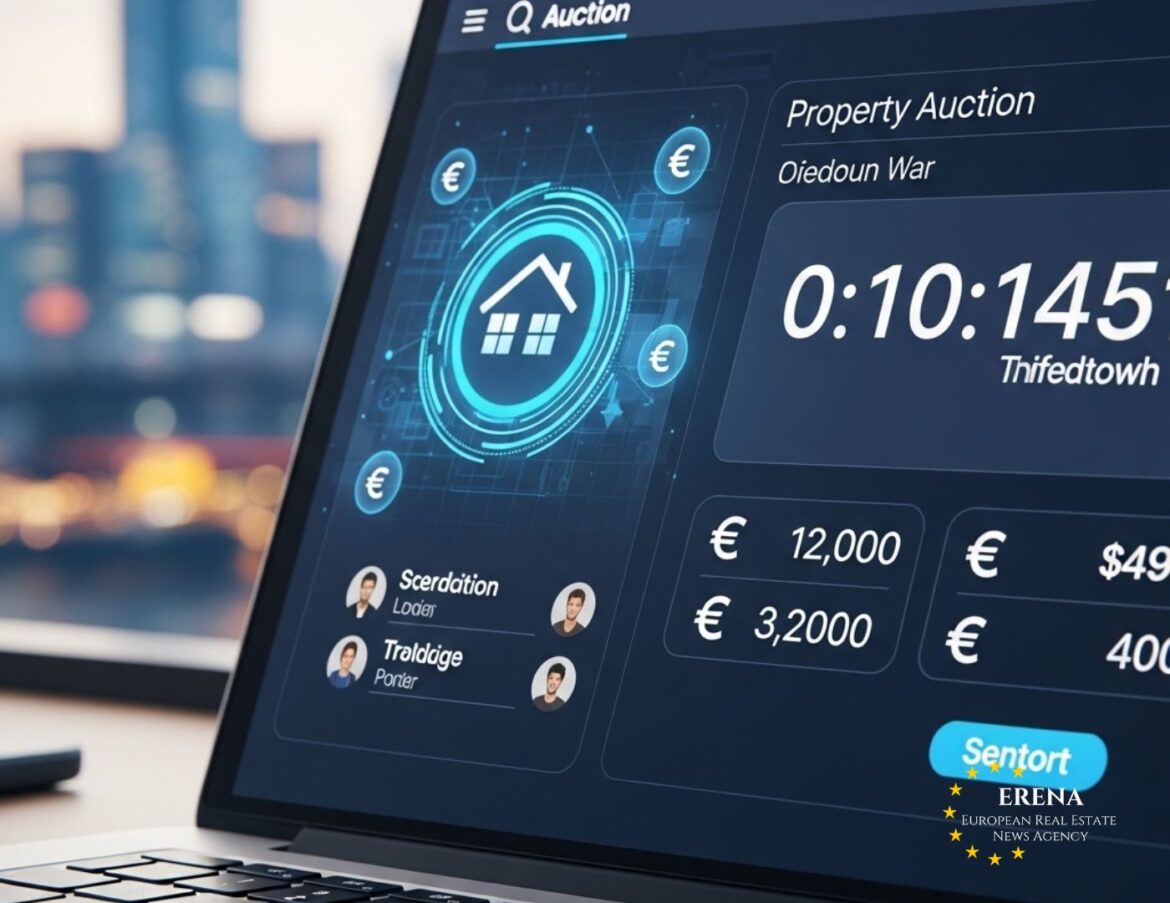Once considered a niche solution for distressed or bank-owned assets, online real estate auctions are rapidly gaining traction as a mainstream investment tool across Europe. As digitalization transforms nearly every aspect of property transactions, more investors — from seasoned professionals to first-time buyers — are turning to virtual auction platforms for speed, transparency, and opportunity.
With rising property prices, intense competition, and demand for faster, more efficient deals, online auctions are emerging as a serious disruptor to traditional methods of property investment. The question is no longer if, but when this transformation will reshape the way we buy and sell real estate on a continental scale.
Speed and Simplicity: The Digital Advantage
Online auctions streamline the entire purchase process. From due diligence and document access to real-time bidding and contract signing, everything is handled remotely. This convenience is especially attractive in highly competitive urban markets.
In the UK, platforms like Allsop and SDL Property Auctions now host monthly events with hundreds of residential and commercial lots. In Germany, Auktionshaus Karhausen and others have popularized the model for commercial and repossessed assets. Meanwhile, French players like Licitor.fr are digitizing judicial property auctions.
Across Europe, data from 2024 show that 5–11% of all real estate transactions in major cities now take place via online auctions, with annual growth rates exceeding 20%.
Benefits for Property Investors
- Transparency
Auction platforms provide access to full legal packs, valuations, surveys, and property visuals well ahead of bidding. This allows investors to assess risks and calculate potential returns with a high degree of certainty. - Faster Transactions
While conventional deals may take months, online auctions finalize sales within 28 days or less. Once the bid is won, the clock starts — and investors are incentivized to act swiftly. - Access to Exclusive Deals
Many online auctions include properties not listed elsewhere: bank repossessions, government-owned buildings, inherited estates, and liquidation assets. - Competitive Pricing
Although bidding can drive up prices, properties at auction often sell below market value. In Germany, average discounts in 2024 ranged from 5–15% compared to listed prices.
Potential Risks and Downsides
Despite the advantages, there are some challenges to consider:
- Limited Time for Due Diligence
Investors often have only a few weeks or even days to analyze the property before bidding. - Upfront Capital Requirements
Most auctions require a deposit of 5–10% upon registration, with the full balance payable within 2–4 weeks — limiting options for buyers reliant on slower mortgage processes. - High Competition
Desirable assets can attract dozens of bidders, pushing final prices higher than expected. - Legal and Occupancy Risks
Some properties may carry unresolved legal issues, unpaid taxes, or sitting tenants. If not identified beforehand, these can result in costly complications post-purchase.
The European Landscape
United Kingdom
The UK has embraced online property auctions faster than most. Residential prices at auction range from £80,000 (€94,000) in cities like Manchester to £350,000 (€410,000) in London. Institutional and private investors alike use auctions to expand portfolios efficiently.
Germany
The auction market is growing steadily, particularly for bank-owned and commercial assets. Platforms like Karhausen and Argetra provide digital bidding interfaces and even allow remote notarization. Starting prices can go as low as €25,000.
France
Judicial auctions are increasingly digital. Licitor.fr recorded over €1.2 billion in sales in 2024. French law still requires in-person elements in some cases, but hybrid formats are gaining ground.
Southern Europe
In Spain and Portugal, foreclosure-related auctions are frequent. Platforms like SubastaBOE and eactivos.com host thousands of listings, giving investors access to underpriced properties in high-demand regions.
The Rise of PropTech-Driven Auctions
Innovative technology is playing a major role in scaling auction adoption. Blockchain is being tested for transaction security, while AI tools assist buyers in comparing investment metrics across listings. Scandinavian platforms are pioneering blockchain-based deed registration and instant buyer verification.
Some auction portals now offer bundled services, including:
- Legal review
- Financing solutions
- Property management onboarding
- Renovation estimates
This full-service model creates a seamless pipeline from search to investment — ideal for remote or international investors.
Changing the Traditional Model
Real estate agents and developers are adapting to stay competitive. In cities like Milan, Warsaw, and Prague, new-build apartments are being sold via auction directly by developers to accelerate sales and reduce marketing costs.
In parallel, public housing agencies and municipalities are increasingly using online auctions to offload underused assets and reinvest in social housing projects.
Is This Format for Everyone?
Not necessarily. Buyers who prefer slow, cautious negotiation or need long-term financing may still opt for traditional routes. But for cash-ready investors or those using bridge financing, auctions present a high-speed path to asset acquisition.
Moreover, investors comfortable with risk and experienced in due diligence tend to thrive in auction environments.
Outlook for 2025 and Beyond
If current trends hold, online property auctions could represent more than 20% of total real estate transactions in Europe by 2030. Urban investors, institutional buyers, and international funds are all increasing their exposure to auction portfolios.
The acceleration of legal and financial integration — including cross-border title recognition and e-notarization — will further boost adoption.
Conclusion
Online real estate auctions are not just a temporary trend. They reflect a broader transformation of how real estate is traded, financed, and managed in a digital-first world.
For investors seeking speed, access, and transparency, online auctions are becoming one of the most powerful tools in modern property investment. As the ecosystem matures, these platforms may well redefine what it means to invest in real estate across Europe.

